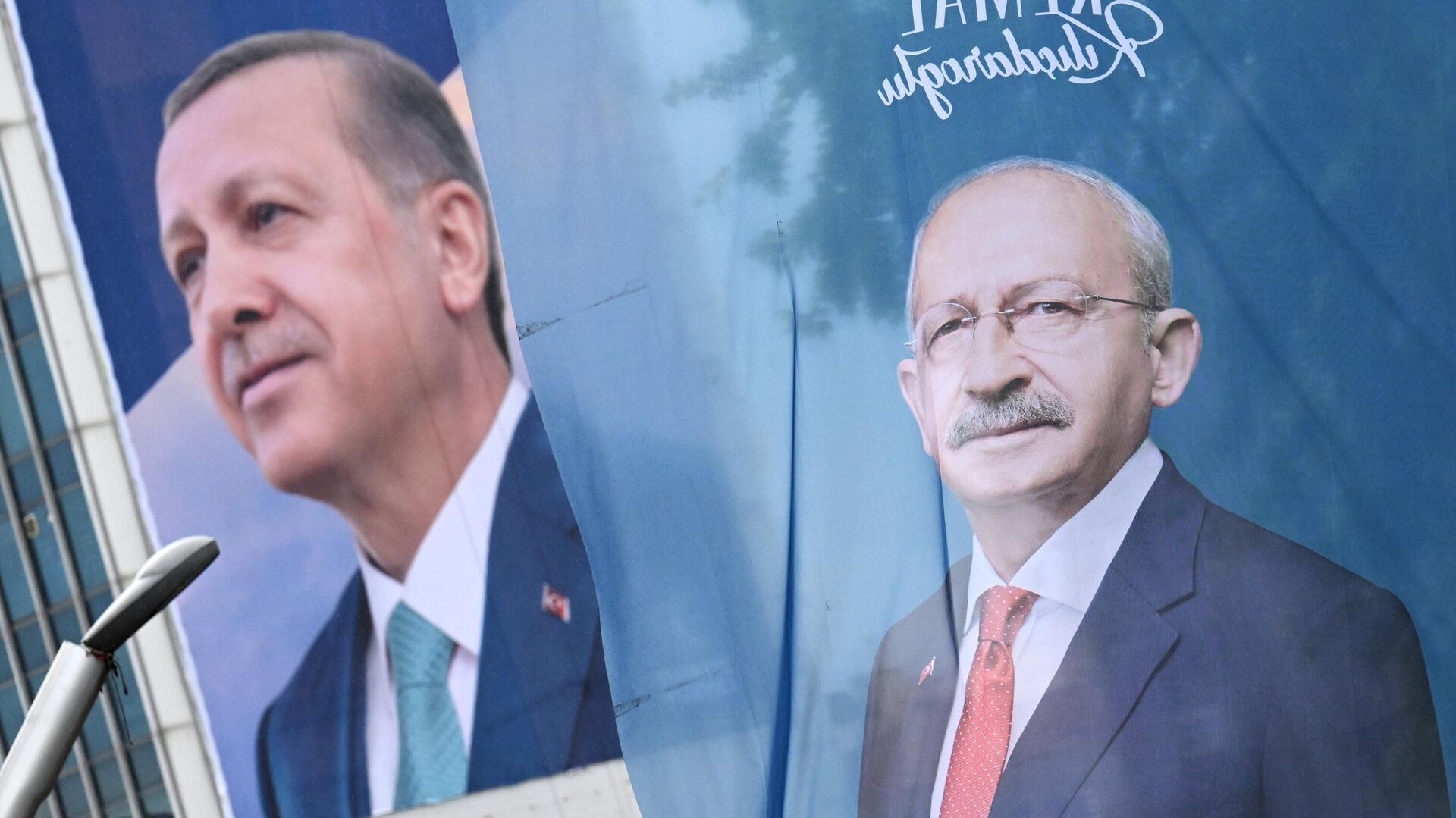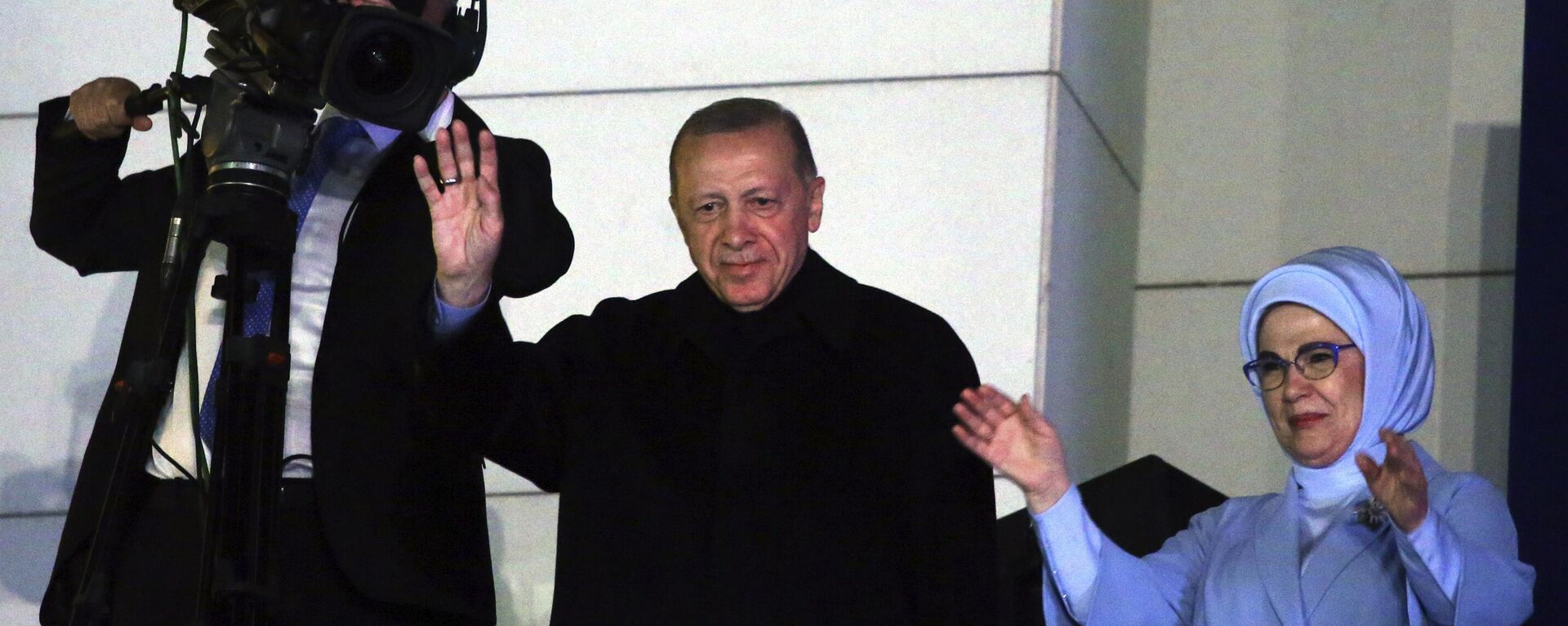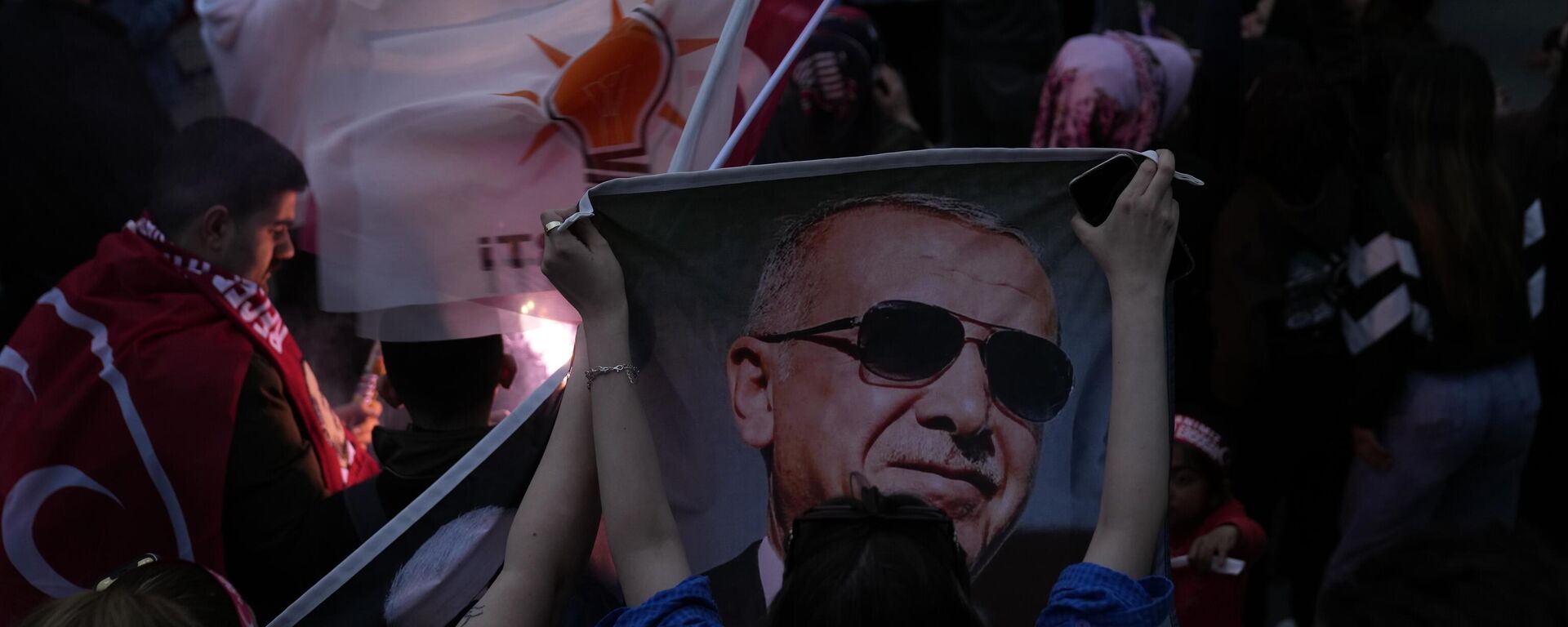https://sputniknews.in/20230528/serious-turnaround-in-trkiyes-ties-with-russia-unlikely-after-election-says-academic-2201363.html
‘Serious Turnaround’ in Türkiye’s Ties With Russia Unlikely After Election, Says Academic
‘Serious Turnaround’ in Türkiye’s Ties With Russia Unlikely After Election, Says Academic
Sputnik India
The prospect of a “serious turnaround” in Türkiye’s foreign policy direction is “unlikely” after the presidential run-off on Sunday, an academic has told Sputnik.
2023-05-28T12:03+0530
2023-05-28T12:03+0530
2023-05-28T12:03+0530
turkiye
russia
black sea initiative (grain deal)
ukraine
nato
recep tayyip erdogan
syrian civil war
iran
2023 turkiye presidential election
kemal kilicdaroglu
https://cdn1.img.sputniknews.in/img/07e7/05/1c/2203475_0:172:3029:1875_1920x0_80_0_0_6262a6adb4975bc409abca2073fded2c.jpg
The prospect of a “serious turnaround” in Türkiye’s foreign policy direction is “unlikely” after the presidential run-off on Sunday, an academic has told Sputnik.Muddassir Quamar, an Associate Professor at Centre for West Asian Studies, School of International Relations at New Delhi-based Jawaharlal Nehru University (JNU), said that opposition candidate and Republican People’s Party (CHP) Kemal Kilicdaroglu will not find it easy to “mend relations” with the West in case he manages to pull off a victory.To begin with, Quamar reckoned that it would be a “steep climb” for Kilicdaroglu to win the election since nationalist presidential candidate Sinan Ogan, who came third in the first round this month, has pledged his support to Erdogan’s Justice and Development (AK) party led-alliance.Quamar remarked that Türkiye’s “strategic neutrality” in tensions between the western powers and Russia wasn’t only President Recep Tayyip Erdogan’s position, but a policy stance espoused by the foreign policy establishment in Ankara.In spite of being a member of the North Atlantic Treaty Organization (NATO), Türkiye has refused to take sides in the ongoing Ukraine conflict and in fact, expanded its commercial relationship with Moscow to record levels. Ankara has also played a key role in the Black Sea Grain Initiative (the grain deal), as well as has supported the idea of acting as a transit hub for Russian energy and fertilizer supplies to third countries.Kilicdaroglu Tilt Towards the WestBut Kilicdaroglu has said that if elected, he would comply with West’s sanctions with Russia while also maintaining Russian investments in Türkiye. He has further said that he would attract increased investments into Türkiye amid concerns over its economic situation.Türkiye’s domestic inflation hit a 24-year-record of 84 per cent last August, prompting Erdogan to lower the interest rates. However, the decision sparked a lowering of the value of Turkish lira vis-aa-vis the US dollar, causing an increase in the imports bill.To make matters worse, Ankara’s net foreign exchange reserves got into the negative for the first time in 20 years. An opinion poll of Türkiye’s voters by Al-Monitor/Premise found that 57 percent of the respondents rated the economy as the most important election issue.The opposition campaign has also said that he would join the US-led F-35 fighter jet programme from which Ankara was expelled after receiving deliveries of Russian surface-to-air S-400 missile systems.The opposition has said that Türkiye must be part of the “western civilization”.Turkiye Needs to Work With Russia in Syria, Says ExpertImmigration has been a hot-button issue in the presidential election: according to the Al-Monitor/Premise Poll, after the economy, the question of Syrian refugees in Türkiye was the second-most important election issue.Over 3.7 million Syrian refugees live in Türkiye, as per estimates by the United Nations (UN).In what was seen as an effort to pander to the nationalist vote after the first round this month, Kilicdaroglu has committed to send back the Syrian refugees within a year if he comes to power.Umit Ozdag, the leader of the far-right Victory Party, has thrown his weight behind Kilicdaroglu. The CHP-led National Alliance also has other parties espousing Islamist and conservative views, including the Good Party (iYi) and the Felicity Part (SAADET).The academic said that any move by Ankara to facilitate the return of Syrian refugees would “pre-suppose” some resolution of the Syrian conflict, which began in 2011.Under the Astana Process, which was launched in 2017, Russia, Iran and Türkiye have acted as guarantors of peace in Syria as they broker talks between the Bashar al-Assad government and the various Syrian opposition factions.Erdogan launched a military intervention in Syria in 2016 amid concerns over activities of Daesh* affiliates,as well as those Kurdish People’s Protection Units (YPG), which Ankara views as an extension of the Kurdistan Workers’ Party (PKK), which is listed as a terrorist organization in Türkiye.Erdogan has said that he remained committed to flush out YPG from border areas at Syria-Türkiye border and that the goal is shared by both Iran and Russia.* Daesh (also known as IS/ISIS) is a terrorist organization banned in Russia and other states
https://sputniknews.in/20230515/erdogan-says-confident-in-winning-presidential-runoff-on-28-may-1984167.html
https://sputniknews.in/20230518/turkiye-will-continue-to-support-pakistan-on-kashmir-no-matter-who-wins-election-expert-2028532.html
turkiye
russia
ukraine
iran
middle east
Sputnik India
feedback.hindi@sputniknews.com
+74956456601
MIA „Rossiya Segodnya“
2023
Dhairya Maheshwari
https://cdn1.img.sputniknews.in/img/07e6/0c/13/138962_0:0:641:640_100x100_80_0_0_2cb44360dbcdf6d84bf4b299cd045917.jpg
Dhairya Maheshwari
https://cdn1.img.sputniknews.in/img/07e6/0c/13/138962_0:0:641:640_100x100_80_0_0_2cb44360dbcdf6d84bf4b299cd045917.jpg
News
en_IN
Sputnik India
feedback.hindi@sputniknews.com
+74956456601
MIA „Rossiya Segodnya“
Sputnik India
feedback.hindi@sputniknews.com
+74956456601
MIA „Rossiya Segodnya“
Dhairya Maheshwari
https://cdn1.img.sputniknews.in/img/07e6/0c/13/138962_0:0:641:640_100x100_80_0_0_2cb44360dbcdf6d84bf4b299cd045917.jpg
turkey election 2023, turkey election results, turkey news, erdogan election, erdogan news, turkey opinion polls, turkey opinion polls 2023, syrian refugees in turkey, syrian refugees, turkiye election live, तुर्की चुनाव 2023 live, turkey election 2023 updates, turkey election results 2023, turkey presidential runoff, turkey polls results, who is president of turkey, turkey elections live updates, turkey elections live updates, तुर्की चुनाव 2023, turkiye presidential election 2023, turkey-russia ties, erdogan foreign policy, who is president of turkey, who is erdogan,
turkey election 2023, turkey election results, turkey news, erdogan election, erdogan news, turkey opinion polls, turkey opinion polls 2023, syrian refugees in turkey, syrian refugees, turkiye election live, तुर्की चुनाव 2023 live, turkey election 2023 updates, turkey election results 2023, turkey presidential runoff, turkey polls results, who is president of turkey, turkey elections live updates, turkey elections live updates, तुर्की चुनाव 2023, turkiye presidential election 2023, turkey-russia ties, erdogan foreign policy, who is president of turkey, who is erdogan,
‘Serious Turnaround’ in Türkiye’s Ties With Russia Unlikely After Election, Says Academic
Türkiye’s President Recep Tayyip Erdogan is eyeing a third term in power as he faces his 74-year-old challenger Kemal Kilicdaroglu in the run-off vote in a keenly watched contest. Erdogan polled 49.52 percent of the vote in the first round, while his challenger secured 44.8 percent vote. Opinion polls have given an edge to Erdogan.
The prospect of a “serious turnaround” in Türkiye’s foreign policy direction is “unlikely” after the presidential run-off on Sunday, an academic has told Sputnik.
Muddassir Quamar, an Associate Professor at Centre for West Asian Studies, School of International Relations at New Delhi-based Jawaharlal Nehru University (JNU), said that opposition candidate and Republican People’s Party (CHP) Kemal Kilicdaroglu will not find it easy to “mend relations” with the West in case he manages to pull off a victory.
To begin with, Quamar reckoned that it would be a “steep climb” for Kilicdaroglu to win the election since nationalist presidential candidate Sinan Ogan, who came third in the first round this month, has pledged his support to Erdogan’s Justice and Development (AK) party led-alliance.
“Russia is an important partner for Türkiye in more than one way and Ankara is unlikely to abandon economic and energy ties with Moscow,” the academic underlined.
Quamar remarked that Türkiye’s “strategic neutrality” in tensions between the western powers and Russia wasn’t only President Recep Tayyip Erdogan’s position, but a policy stance espoused by the foreign policy establishment in Ankara.
“Hence, except for some nuances, any serious turnaround or shift in foreign policy direction is unlikely,” stated the academic.
In spite of being a member of the North Atlantic Treaty Organization (NATO), Türkiye has refused to take sides in the
ongoing Ukraine conflict and in fact, expanded its commercial relationship with Moscow to record levels.
Ankara has also played a key role in the Black Sea Grain Initiative (the grain deal), as well as has supported the idea of acting as a transit hub for Russian energy and fertilizer supplies to third countries.
Russia-Türkiye economic relationship expanded to $62 billion in 2022-23, largely underpinned by rising Russian energy imports. The two countries signed an economic cooperation roadmap to take the trade volume to $100 billion.
Kilicdaroglu Tilt Towards the West
But Kilicdaroglu has said that if elected, he would comply with West’s sanctions with Russia while also maintaining Russian investments in Türkiye. He has further said that he would attract increased investments into Türkiye amid concerns over its economic situation.
Türkiye’s domestic inflation hit a 24-year-record of 84 per cent last August, prompting Erdogan to lower the interest rates. However, the decision sparked a lowering of the value of Turkish lira vis-aa-vis the US dollar, causing an increase in the imports bill.
To make matters worse, Ankara’s net foreign exchange reserves got into the negative for the first time in 20 years. An opinion poll of Türkiye’s voters by Al-Monitor/Premise found that 57 percent of the respondents rated the economy as the most important election issue.
The opposition campaign has also said that he would join the US-led F-35 fighter jet programme from which Ankara was expelled after receiving deliveries of Russian surface-to-air S-400 missile systems.
The opposition has said that Türkiye must be part of the “western civilization”.
Turkiye Needs to Work With Russia in Syria, Says Expert
Immigration has been a hot-button issue in the presidential election: according to the Al-Monitor/Premise Poll, after the economy, the question of
Syrian refugees in Türkiye was the second-most important election issue.
Over 3.7 million Syrian refugees live in Türkiye, as per estimates by the United Nations (UN).
In what was seen as an effort to pander to the nationalist vote after the first round this month, Kilicdaroglu has committed to send back the Syrian refugees within a year if he comes to power.
Umit Ozdag, the leader of the far-right Victory Party, has thrown his weight behind Kilicdaroglu. The CHP-led National Alliance also has other parties espousing Islamist and conservative views, including the Good Party (iYi) and the Felicity Part (SAADET).
“The issue of Syrian immigrants in Turkey was a major discussion in the elections and it is likely whosoever comes to power will try to find ways to return the Syrians back to their country,” Quamar said.
The academic said that any move by Ankara to facilitate the return of Syrian refugees would “pre-suppose” some resolution of the Syrian conflict, which began in 2011.
“I would therefore suggest that there is all likelihood of Türkiye working with Russia and Iran through the Astana process to find a workable solution in Syria in the coming years. And, although it might sound strange at this point, I would foresee a degree of continuity in Turkish foreign policy even if there is a change in presidential office in Ankara,” Quamar reckoned.
Under the Astana Process, which was launched in 2017, Russia, Iran and Türkiye have acted as guarantors of peace in Syria as they broker talks between the Bashar al-Assad government and the various Syrian opposition factions.
Erdogan launched a military intervention in Syria in 2016 amid concerns over activities of Daesh* affiliates,as well as those Kurdish People’s Protection Units (YPG), which Ankara views as an extension of the Kurdistan Workers’ Party (PKK), which is listed as a terrorist organization in Türkiye.
Erdogan has said that he remained committed to flush out YPG from border areas at Syria-Türkiye border and that the goal is shared by both Iran and Russia.
* Daesh (also known as IS/ISIS) is a terrorist organization banned in Russia and other states




